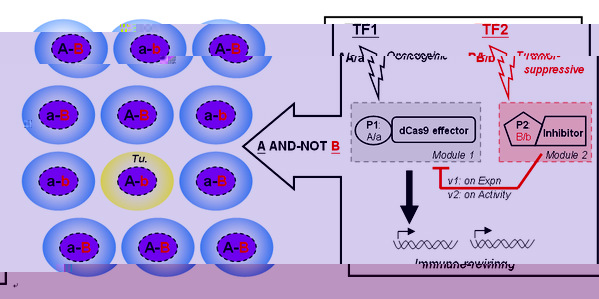Reinvigoration of antitumor immunity has recently become the central theme for the development of cancer therapies. Nevertheless, the precise delivery of immunotherapeutic activities to the tumors remains challenging. Wang et al. explore a synthetic gene circuit-based strategy for specific tumor identification, and for subsequently engaging immune activation. By design, these circuits are assembled from two interactive modules, i.e., an oncogenic TF-driven CRISPRa effector, and a corresponding p53-inducible off-switch (NOT gate), which jointly execute an AND-NOT logic for accurate tumor targeting. In particular, two forms of the NOT gate are developed, via the use of an inhibitory sgRNA or an anti-CRISPR protein, with the second form showing a superior performance in gating CRISPRa by p53 loss. Functionally, the optimized AND-NOT logic circuit can empower a highly specific and effective tumor recognition/immune rewiring axis, leading to therapeutic effects in vivo. Taken together, this work presents an adaptable strategy for the development of precisely delivered immunotherapy.

Dr. Jianghuai Liu and Geng Liu from Model Animal Research Center at the Medical School of Nanjing University, and Dr. Xingxu Huang from ShanghaiTech University, together with a number of collaborators from several institutions, contributed to this project. The work has been published in Nature Communications (“Precise tumor immune rewiring via synthetic CRISPRa circuits gated by concurrent gain/loss of transcription factors,” 2022).



